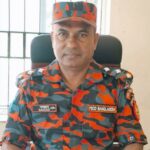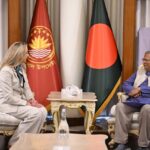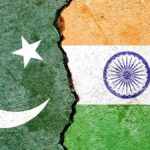Safowan Hossain Khan: The 53rd Director General (DG) level border conference between the Indian Border Security Force (BSF) and the Border Guards of Bangladesh (BGB) took place in Delhi from June 11 to 14, lasting four days. Major General AKM Nazmul Hasan, Director General of BGB, led a 14-person delegation from Bangladesh while Sujoy Lal Thaosen, Director General of BSF, led a 10-person team from India at the four-day conference.
The meeting covered topics such as shooting, killing, and injuring unarmed Bangladeshi citizens near the border as well as smuggling different kinds of contraband into Bangladeshi territory.
On the first day of the discussion, it was also discussed how to get rid of unlicensed development infrastructure and other blocked development projects within 150 yards of the border as well as the infiltration of forcibly displaced Myanmar citizens into Bangladesh via the Indian border.
The conference also covered a number of other topics, such as the construction of an effective water treatment facility to remove waste water from the border canal that runs from Agartala to Akhaura, the reopening of the Rahimpur Canal’s mouth with the Kushiara River in Jokiganj, the exchange of information on potential locations for regional separatist armed terrorist groups’ camps and their activities, and the prevention of Indian telecom networks from expanding inside Bangladeshi borders.
The expansion of bilateral relations, the efficient implementation of the “Coordinated Border Management Plan-CBMP” to handle border management and border-related issues, and different efforts aimed at boosting mutual trust and goodwill were also covered.
The identical Bangladesh-India border gave rise to a number of issues such as cross border smuggling, terrorist activities, border fencing, human and drug trafficking, border killing etc that often vitiated friendly relations between the two neighbours. More importantly, millions of people living in the border continue to suffer economic hardships and physical restrictions due to frequent incidents along the border.In order to improve local life and ease border tensions, the border guarding forces of India and Bangladesh have decided to launch five development projects along their 4,096-kilometer shared border.
A Bailey bridge will be built, roads will be repaired, and retaining walls will be strengthened, among the five projects. The initiatives will be carried out in Assam, West Bengal, Mizoram, Meghalaya, and Tripura, five bordering states.
Construction of a bailey bridge over the Sonai River in Mohanpur, which is on this side of the border, is one of the projects, according to BSF personnel. Bangladesh intended to finish the Ramgarh School building. Similar to this, the two sides agreed to build a brick road close to the Tripuran city of Dharmanagar’s Ragna Nagar Land Customs Station.
BGB received approval with a rider for electrical supply network expansion work close to the Jhalongi and Vitorbari pockets on the other side of the border. BGB received approval with a rider for electrical supply network expansion work close to the Jhalongi and Vitorbari pockets on the other side of the border. It was mutually agreed that construction projects could proceed “without changing the course of the river and sluice gate” that serve as Tripura’s border markers. Additionally, the two nations approved the building of retaining walls along the rivers Bugai and Mymensingh on both sides of the border.
A total of five development projects were decided upon, enhancing the joint efforts towards progress and prosperity in the region. This historic decision will have a profoundly positive impact on the lives of the population along the India-Bangladesh border. This choice demonstrated the two prime ministers’ shared commitment to giving development projects that benefit border communities and fulfill their ambitions first priority.
The two forces agreed to have a meeting of nodal officers within a month to resolve issues relating to infrastructure and development projects. The single row border fencing is also in progress. According to the BSF, the two friendly neighbors also agreed to “pursue and share real-time information and interrogation reports of traffickers (if any) and assured to remain extra vigilant to curb them in order to make the India-Bangladesh border crime free.
On the subject of violent incidents along the border, both neighbors agreed to work cooperatively and professionally, increase joint patrolling, vigilance particularly during the late hours of the night to early morning, intensify public awareness campaigns, share real-time information, and make every effort to bring these criminals to justice.
(Author Profile: Safowan Hossain Khan is a researcher specializing in South Asian Affairs)







